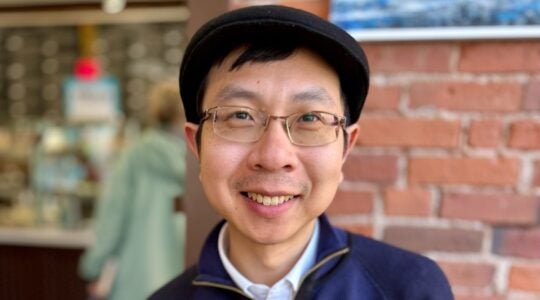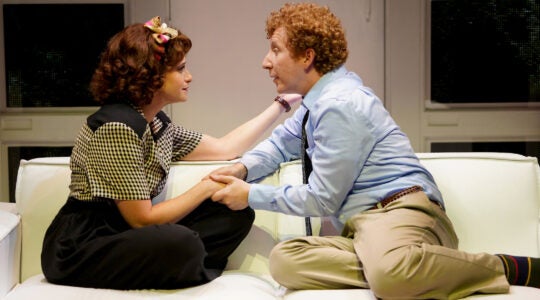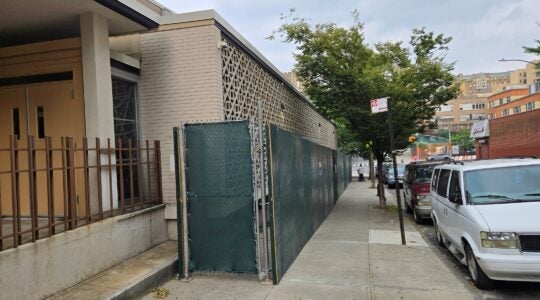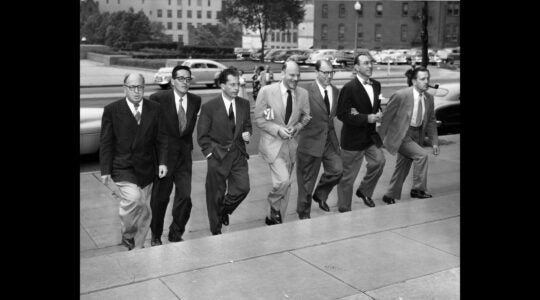COLD SPRING, New York — Samantha Schlectman can’t choose which activity she likes best at Surprise Lake Camp. There’s archery. And swimming. Then there’s the bright blue and yellow trampoline on the lake. And don’t forget the camp Olympics — this year’s theme was Star Wars. But for the 13-year-old fifth-year camper, Shabbat is one of the most special things about camp.
“I like how the whole camp comes together for Shabbat and how we all sing the same songs. I do more Jewish stuff here than home. I like that,” she said while taking a break from the nearby ropes course.
Nestled between two ridges in upstate New York, Surprise Lake Camp, which was founded in 1902, is one of the two oldest Jewish summer camps in the United States. An afternoon spent talking with campers and staff showed how camps can build and strengthen Jewish identity through a mix of traditions — some Jewish, some secular.
According to the Foundation for Jewish Camp, kids who go to Jewish camp are 10 percent more likely to marry a Jewish partner, 21% likely to feel being Jewish is very important, and 55% more likely to feel emotionally attached to Israel.
Moreover, FJC, which is affiliated with 150 Jewish camps, found that adults who participated in Jewish camp are 37% more likely to regularly light Shabbat candles, 45% more likely to attend synagogue at least once a month and 30% more likely to donate to a Jewish federation.
Jodi Sperling, Senior Consultant for JCC Overnight Camps at JCC Association of North America said the reason for these relatively high numbers can be explained in one word: community.
“Camp, when done well, instills in them a sense of what it is like to be a part of a community. Kids get to experience what it feels like to be in a place that places such a high value on ritual and tradition,” Sperling said. “Having these shared experiences helps kids want to be part of a Jewish community when they leave camp. When they go to college maybe they join Hillel or Chabad. Maybe they join a Jewish fraternity or sorority and when they have kids join a synagogue or simply light the candles Friday night.”
There are hundreds of Jewish summer camps in the United States. There are 15 independent, overnight camps affiliated with JCC Association, as well as 11 JCC-operated overnight camps. These are among some 150 camps affiliated with FJC.
Most overnight camps start the end of June and run through the third week of August. They offer either one session, which lasts about a month, or a full summer, roughly twice that. The price of overnight camp varies widely. One session averages between $3,000 and $4,500 while a full summer averages between $6,500 to $8,500. Camps typically host between 200 to 350 campers.
At one camp tradition could mean dressing in blue and white for Shabbat services, while at another camp it might mean performing all the plays in Hebrew. Some camps recite the birkat hamazon (grace after meals) after every meal while others make it a point to hold Havdalah services on the waterfront.
Of course, it’s not only the Jewish rituals that matter. It could be having a barbecue for breakfast and pancakes for dinner or holding a “day without sun” where older campers go about their camp schedule at night.
For Ryan Liebowitz, who has come here the past five summers, it’s the little things such as having bagels, lox and muffins for breakfast every Saturday morning.
“I knew I was going to come here when I visited. I came for four weeks but I liked it so much I stayed for the whole summer. I love all the people here, being in the nature. I love drama, the lake and the pool and I love the blintzes — the potato ones,” Liebowitz said.
Summer traditions
Camps cast a spell because they can create their own traditions that get repeated year after year, decade after decade, said Rabbi Avi Orlow, vice president of program and innovation at the Foundation for Jewish Camp. FJC works with over 300 day and overnight camps and summer experiences from all streams of Jewish belief and practice.
“The camp day is replete with ritual — although I’m hesitant to use the word ritual. Rather, all these moments are traditions, some of them complementary to Jewish life, others not directly, but that doesn’t make them less impactful or meaningful. In fact, they are the ones that create the biggest memories,” Orlow said.
Certainly, it has made a lasting impact for Sam’s mother, Marni Schlectman. Now on the Surprise Lake staff, she was a camper from 1978 through 1986.
“The Judaism here is really special. The kids get to meet Israeli staff, something that was cool even when I was a camper. There is more Jewish programing now; we talk about the Jewish holidays and as a parent I see how my kids get exposed to Jewish culture from Hebrew school and camp,” Schlectman said.
This sense of connectivity doesn’t happen by accident, said Orlow.
In the past five years FJC has developed leadership and training programs. To date, 53 camp directors have graduated from its Executive Leadership Institute. This program, and others such as the Cornerstone Fellowship which has trained more than 2,500 returning bunk counselors, are all geared toward helping camps create environments that help campers express their Jewish identity outside mainstream institutions. Another FJC initiative is One Happy Camper, which provides a $1,000 stipend to any first-time participant to any Jewish overnight camp.
Increasingly camps are looking for ways to remain engaged with their campers, staff and alumni long after camp closes for the season. Some hold Rosh Hashana services, others schedule wintertime activities such as ice skating.
The many forms of American Judaisms
Jewish camps first appeared in North America at the turn of the 20th century. Initially, they offered children a chance to escape to nature from New York City tenements. They were also seen as a way to help “Americanize” children of eastern European immigrants, according to FJC. By the 1920s programming started to change. Many camps adopted more Jewish cultural and educational missions.
Today more than 200,000 campers and counselors spend between three and eight weeks at Jewish summer camp. And there are as many kinds of Jewish summer camps as there are campers.
“There is a perception that families have to choose between a great camp or a great Jewish environment; that those two things can’t be in sync. That’s not true — now you can find a Jewish camp that focuses on horseback riding and one that focuses on theater,” said Sperling.
Some are kosher style and some — like Surprise Lake Camp — are kosher with supervision and Shabbat observant. There are also specialty Jewish camps that focus on social justice and others that focus on sports.
There are Jewish camps for every denomination and every kind of Jewish family — interfaith, gay, biracial children and children of couples of color. Some kids hail from towns or cities with large Jewish populations, others have never stepped foot in synagogue. There are kids whose only interaction with Judaism is latkes on Hanukah and others who recite the shema prayer nightly.
The important thing, said Bradley Solmsen, executive director of Surprise Lake Camp, is that once children get to camp they are exposed to many ways of being Jewish.
For some kids here this is the only source of Jewish identity. We think it’s our Jewish mission to think of how you can make a difference in the world. We want them to learn that taking care of their friends in their bunk, or being taken care of, are all things that Judaism says is important,” said Solmsen steering a golf cart over a rock-strewn path on the way to the waterfront.
For Elias Blasser-Mulligan, 13, he feels most Jewish at camp.
“Normally we go to Temple on big holidays. I feel like camp brings me closer to Judaism and that’s super cool,” he said with a wide grin on his face.
Blasser-Mulligan started coming to Surprise Lake when he was eight and doesn’t go to Hebrew school back home in Queens, New York. So he was excited to learn the camp had a b’nei mitzvah program.
In two weeks Elias will become a bar mitzvah in front of his friends, or his second family as he calls them, as well as his parents and relatives. Now in its 20th year, the program lets campers have their bar or bat mitzvah at camp as part of Saturday morning services.
First-time camper Sonya Weinstock of Staten Island couldn’t wait to come to Surprise Lake Camp this summer. The 13-year-old stopped to chat on her way back from swimming.
“I love the people here, all the activities. I love the services on the beach. It’s so fun,” she said.
She also enjoys the hikes led by Joel “Whammy” Kaufman, otherwise known as the Camp Icon.
Kaufman has been coming to camp for 48 years. These days he leads hikes and works as the camp photographer. He met his first and second wives here and all four of his children have attended — two are now on staff and two are still campers.
He keeps coming back to this wooded idyll nestled between two ridges for one simple reason: “When you find a nice place, you stay there.”
The New York Jewish Week brings you the stories behind the headlines, keeping you connected to Jewish life in New York. Help sustain the reporting you trust by donating today.




